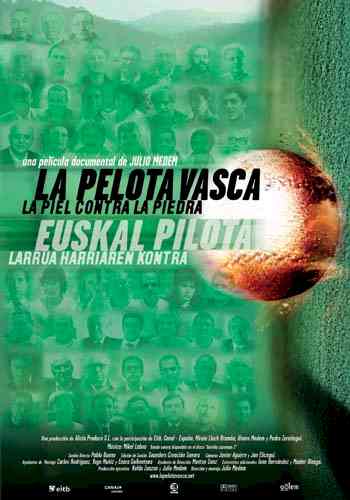|
Euskal Pilota, larrua harriaren kontra |
|

Julio Medem |
|
|
|
|
|
|
|
| Fiachra Gibbons in San Sebastian Monday September 22, 2003 Medem's The Basque Ball The most controversial Spanish film in decades was shown last night in the face of a government campaign of opposition to it that has raised the specter of the bad old days of General Franco's dictatorship. The Basque Ball, an emotionally-charged documentary by the acclaimed director Julio Medem, which urges the authorities in Madrid to reopen talks with Basque extremists, was cheered at the San Sebastian film festival after convulsing Spain in an ugly debate over whether it should be outlawed. The ruling right-wing Popular Party refused to take part in the film, and has kept up a ferocious assault on what they termed Basque-born Medem's "suspicious enterprise", with the culture minister Pilar Del Castillo leading the attacks on the festival organizers for showing it. But many anti-secessionist Basques have rallied to Medem's defense, with the socialist mayor of San Sebastian Odon Elorza claiming the clock was being turned back to the "time when the man with the little moustache (Franco) covered women's breasts, had the bottoms of nudes draped and eliminated all 'red' films... It is one thing to criticize a film, but it's another to do all you can to make sure it is never shown." Medem, the director of Sex and Lucia, the Red Squirrel, and Cows, claimed he was not a nationalist, but despaired at the division the lack of dialogue was causing in the Basque country, almost half of whose inhabitants are "immigrants" from the rest of Spain, drawn by its relative prosperity. Advocating talks with the separatist terror group ETA or its supporters, however, has been heresy since the Spanish prime minister Jose Maria Aznar's government banned the group's political wing Herri Batasuna last year and closed down a string of cultural organizations, including dance and music groups, which it claimed were fronts for its activities. The ban has led to a revival in support for party, whose vote had plummeted to a mere 10% after ETA broke a 14-month ceasefire in 1999, alleging that Mr Aznar - who survived an attempt on his life before he was elected - had sabotaged peace talks. Ms Del Castillo, who refused an invitation to see the film, accused Medem of blaming Mr Aznar as much as the terrorists for the impasse. "When you start from the position that a legally constituted government voted for by 10m people is one pole, and the other is a terrorist group, that puts you in a delicate position. With that starting point it would be very difficult to make a balanced documentary... I find it odd that the film festival has allowed it to be screened," the minister said. But far from taking a pro-nationalist line, the film, for which more than 70 of the autonomous region's politicians, intellectuals and victims of violence were interviewed, makes extremely uncomfortable viewing for the Basque country's nationalist government, never mind ETA. Even some victims' groups angry about the film's mention of torture, and the secret GAL assassination campaign waged by the security forces - who account for half of those killed by ETA - said the film was generally fair and honest.
|
|
